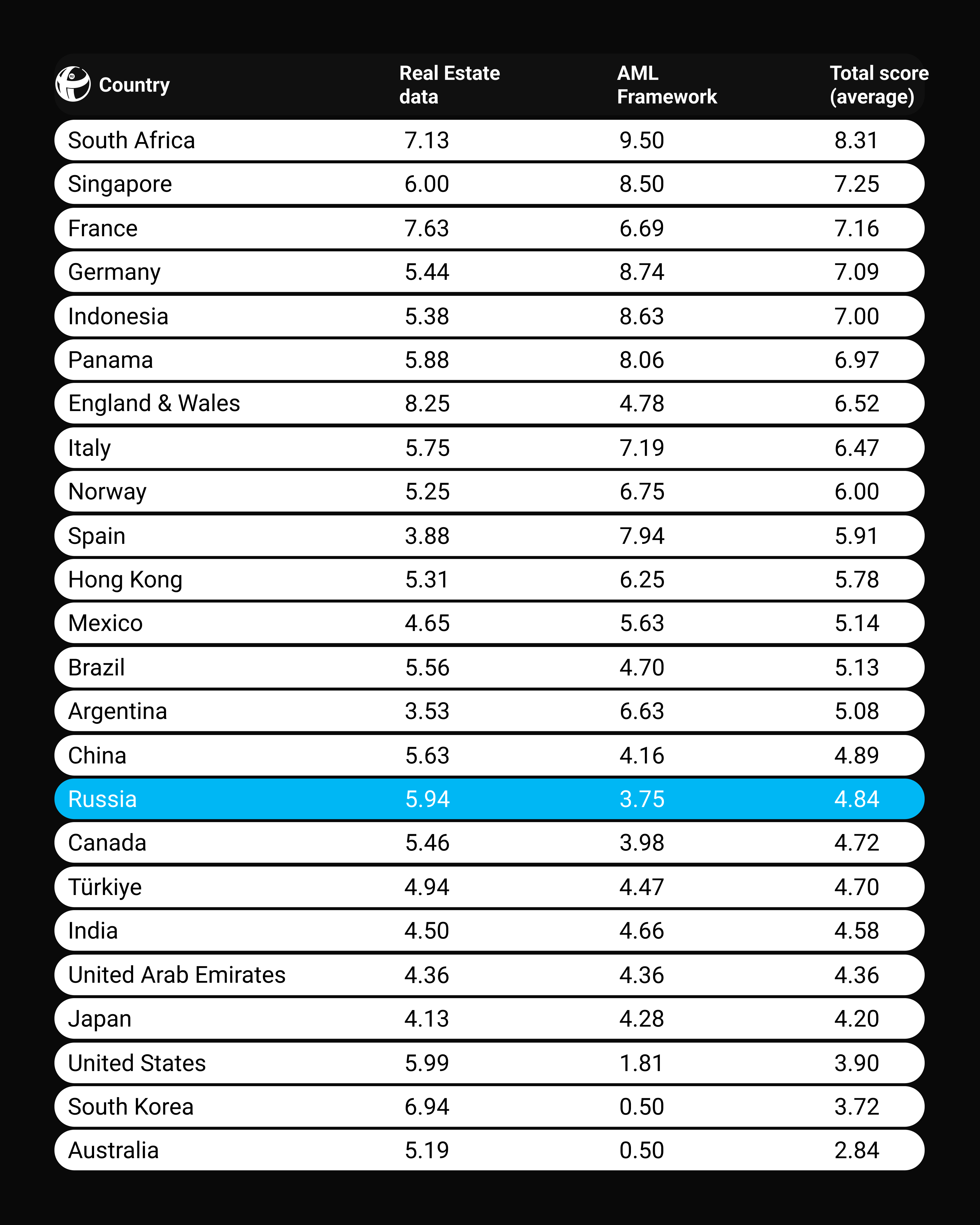The global real estate market remains one of the least protected from money laundering. Despite bold promises and reform announcements, in most countries worldwide, residential and commercial property can still be purchased anonymously — without proper scrutiny, oversight, or transparency. Transparency International and the Anti-Corruption Data Collective (ACDC) have jointly launched the first comprehensive assessment of how effectively countries prevent abuse in this sector — and where loopholes remain open for dirty money.
In many advanced economies and major financial centres, real estate remains a safe haven for illicit funds. Criminals, corrupt officials, and their enablers find ways to invest in property without attracting law enforcement attention. In many jurisdictions, ownership can remain anonymous and transactions can occur without the involvement of independent professionals responsible for due diligence. At the same time, law enforcement and civil society often lack access to complete and reliable data. These are the conclusions of the first edition of the Opacity in Real Estate Ownership Index (OREO), published by the Anti-Corruption Data Collective and Transparency International.
The Index covers 24 jurisdictions, including the 18 G20 countries, as well as Spain, Norway, Hong Kong, Panama, Singapore, and the United Arab Emirates. The analysis is based on two core pillars:
● the availability and completeness of real estate transaction data
● the strength of anti-money laundering (AML) frameworks in the sector
The Index found that no country achieved a perfect score — and ten jurisdictions scored below 5 out of 10.

South Africa scored the highest in the Index: the country collects extensive data on property transactions and applies relatively strong AML measures. However, serious weaknesses remain. Accessing transaction data is a complicated and non-transparent process — and for foreign citizens, it is nearly impossible. This makes investigations and asset tracing significantly more difficult. Several AML provisions were introduced recently, following South Africa’s greylisting by the Financial Action Task Force (FATF). Their real-world implementation remains to be seen.
Australia, South Korea, and the United States ranked among the lowest-scoring jurisdictions, primarily due to a lack of effective regulation of real estate professionals. Australia recently passed legislation extending AML obligations to such professionals, but it will not come into force until July 2026.
Third-party oversight still lacking
One of the most concerning findings is that in countries such as Australia, China, England and Wales, Japan, Türkiye, and the UAE, real estate purchases can be made without the involvement of third parties—such as real estate agents or notaries. This means transactions may be carried out without risk-based scrutiny for money laundering.
Even more worrying is that in countries like Russia and the UAE, property purchases can still be made in cash — bypassing banks and eliminating any traceability of the funds’ origin.
While most jurisdictions require real estate professionals to comply with AML rules, developers who sell properties directly are not always subject to these obligations and are not required to screen customers or report suspicious activity.
Anonymous ownership and closed data
The OREO Index reveals that it is still possible in many countries to buy, own, and sell property anonymously. The most common method is through companies — which rarely have to disclose their true beneficial owners. Even in jurisdictions where local companies must declare beneficiaries (typically through dedicated registers), foreign companies can often invest in property without revealing their real owners. New EU rules are expected to close this loophole in places like France and Spain.
The authors stress that detecting money laundering cases and evaluating the effectiveness of policy responses is impossible without open access to real estate transaction data and connected registers — such as beneficial ownership, corporate, and land registries. To date, none of the jurisdictions assessed meet these transparency standards.
“We have known for a long time that real estate is a magnet for dirty money. And yet, the OREO Index shows that countries, including those that have recently reformed their systems, still have major gaps in their systems. It is no wonder that real estate markets are bursting with dirty cash, making cities around the world unaffordable. While progress has been slow, the OREO Index also shows that international anti-money laundering standards can have an impact. We urge standard-setter bodies such as the Financial Action Task Force and global fora such as the G20 to develop new policies and guidelines to help countries address remaining loopholes,” says Maíra Martini, CEO of Transparency International.
“England & Wales and France score the highest on the data pillar of the OREO Index. It is no coincidence that these are also the places where academics and civil society have been able to conduct in-depth data analyses, generating insights for policymakers and leads for journalists and authorities to pinpoint homes bought with illicit wealth. Public-interest data needs to be in the public domain, everywhere,” comments David Zucconi, Co-Founder and Director of ACDC.
Recommendations
Transparency International and ACDC encourage all jurisdictions to use the OREO Index methodology as a benchmark for building more resilient property markets that are resistant to corruption and illicit wealth.
For further information, interviews, or media enquiries, please contact Transparency International Russia PR Manager Ivan Korzh at: [email protected]

